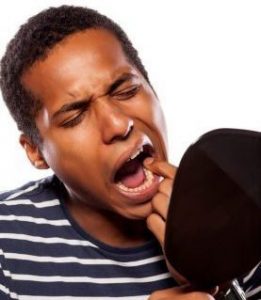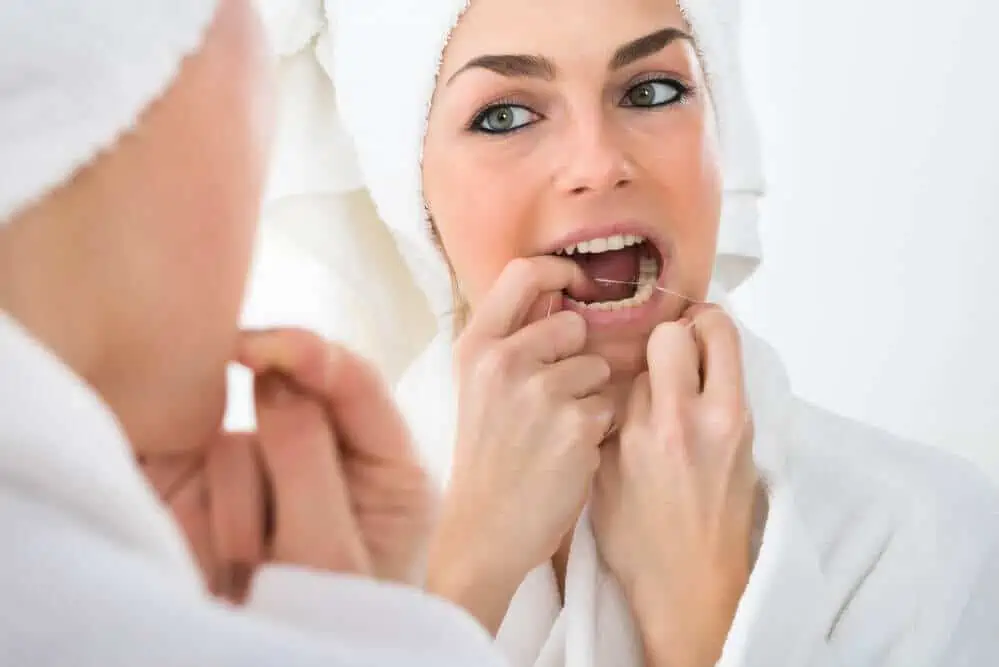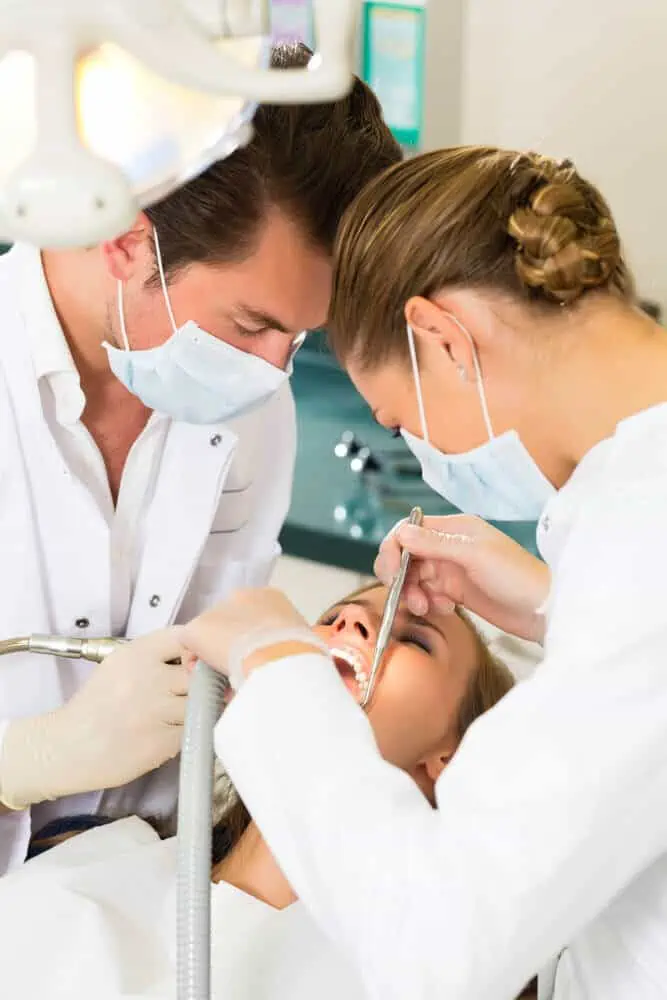Are you worried because you have a loose tooth? There are a few causes of loose teeth in adults which we will discuss. But, regardless of the cause, or which tooth is affected, if your tooth feels loose it should be addressed right away.
At Dentaly.org we want to share advice and answer your questions on caring for your loose tooth so that you can confidently maintain your dental health. In this article we will discuss the following:
- Different causes of loose adult teeth
- Other symptoms associated with those causes
- Treatments
- Preventive measures that you can take to avoid having a loose tooth in the first place
No matter what the cause or severity, if you notice your teeth feel lose you should contact a dentist right away. There are some things you can do at home to prevent loose teeth or care for them, but the only way to ensure a full recovery is by receiving treatment from a professional.

Save the trip to your NHS dentist and speak to a certified dentist right now online. Visit JustAnswer to chat online with a qualified dentist and find out all the information you need – without having to take time out for a dental appointment.
Their dentists are based in the US and are available 24/7 to help you out!
In This Article
Why is my adult tooth loose?
Even though everyone has experienced a loose tooth as a child, once your adult teeth come in they’re supposed to stay securely in place for the rest of your life. Unfortunately, many adults do end up having a loose tooth for various reasons, and there’s no natural tooth ready to take its place.

There are many reasons an adult might have a loose front tooth or back teeth. Some of these reasons include disease, injury, repeated stress, and weakened bone material.
Whatever the initial cause, they all produce a loose tooth through degradation or damage to the bone and tissue that hold teeth firmly in place. If you are wondering why your tooth moves, have a look at these common causes:
Periodontitis
Periodontitis, or gum disease, is by far the most common cause of loose teeth in adults. According to the NHS, the majority of adults in the UK have some degree of gum disease resulting from poor dental hygiene. When plaque on your teeth is not removed by brushing and flossing, it can harden into what is known as tartar.
This hardened material can build up and slowly separate the gum tissue at the base of your teeth. Tartar contains bacteria that, as it accumulates can cause infection within your gums. Some other signs of periodontitis include:
- Swollen gums
- Bleeding gums
- Pus between teeth and gums
- Gum recession
- Food is easily stuck between gums and teeth
If identified and treated by a dentist fairly early your gum health can be restored. This means that your loose tooth can tighten back up without surgery.
However, if left unnoticed until it’s reached an advanced stage, the bone and tissue supporting your teeth will become weaker. If this happens it may require more drastic treatment in order to reverse the effects.

loosen a tooth or even cause teeth loss
Injury
Teeth can be knocked slightly loose tooth after trauma, such as the impact from a sports injury or a car accident. Such an accident can often chip or crack a tooth, or possibly break it off entirely. Sometimes the angle of impact will only damage the underlying tissue and bone, resulting in a loose tooth.
If you have suffered a traumatic injury like this to the mouth or are bleeding and it won’t stop, head to your nearest A&E department. Or, you can call NHS 111 for advice or find an emergency dentist near you.
If the injury is severe and your tooth is very loose, then you will want to visit the dentist’s office as soon as possible. Many general dentists can perform emergency treatments, but you may also want to consider specialists like periodontists (gum specialists) or endodontists (root canal specialists).
Bruxism
Teeth grinding, formally known as bruxism, can also slowly degrade the bone and soft tissue around your teeth over a long period of time. This occurs when a person unconsciously clenches their jaw, sometimes moving it from side to side.
This often occurs while asleep but people can also grind their teeth while awake. Teeth grinding can be caused by many different factors including:
- Stress (by far the most common cause)
- Sleep disorders
- Misalignment of teeth
- Use of antidepressants
- Neurological conditions like Huntington’s disease
- Smoking
- Drinking alcohol
- Use of stimulants
Bruxism is a key cause of loose teeth. It can also cause several other issues, from aching across the jaw and face to cracked and flattened teeth that require multiple crowns and veneers.
High-stress jobs are the most common cause of a clenched jaw, but uncertainty over the past year has also increased teeth grinding. Stress releases adrenaline, which increases the tension in muscles as part of a fight or flight reaction. This causes the jaw to tense, resulting in teeth grinding.
Dr. Kirrin Punia, Fresh Smile Clinic
No matter what the cause, the symptoms are the same and can usually be identified before bruxism causes your teeth to come loose. Symptoms include:
- Headaches
- Earaches or tinnitus
- Stiffness and muscle pain around the jaw
- Pain around neck and shoulders
- Disrupted sleep
- Bleeding gums
Wearing a night guard for teeth grinding at night can help.
Other medical conditions that can cause a loose adult tooth
Some medical conditions can result in teeth becoming loose, most commonly due to a weakening of the bone tissue as a result of osteoporosis, or even pregnancy. Diabetes, for example, is a medical condition that can contribute to more severe periodontitis as it slows healing and increases vulnerability to infections.

Can a loose tooth be saved at home?
There is no procedure for tightening loose teeth at home. The best thing to do is to contact a dentist for advice and treatment.
For early periodontitis, your dentist may instruct you to use regular saltwater rinses to clear the bacteria from your mouth. This will hopefully allow the bone and tissue to recover, resulting in your tooth tightening back up after a few weeks. However, discuss this with your dentist in case you need more urgent treatment.
If you want to know how to save a loose tooth from falling out, it’s fairly simple. Once you have contacted the dentist for a consultation, limit your diet to liquids, very soft solids and avoid chewing with the loose tooth whenever possible. This will help preserve as much healthy tissue as possible while you wait to see a dentist.
If you’re unable to visit a dentist straight away, for whatever reason, the next best option could be an online consultation. It is possible to talk to a dentist online by visiting JustAnswer. These qualified dentists are all are based in the US and are fully qualified and they will be able to advise you on the best course of action.
How to fix teeth that are loose from gum disease
Regardless of the reason for your loosening teeth, your best course of action for treatment will always be contacting a dentist for advice and possibly scheduling an emergency dental appointment.
Treatments for loose teeth can vary depending on the cause and severity of your condition but should always be carried out under the supervision of a medical professional.
Non-surgical treatments
If the cause is identified early as periodontitis, non-surgical treatment can be enough to reverse the spread of gum disease, allowing your gums to heal naturally. These treatments include:
- Scaling: Removal of the built up tartar from the surface of the tooth and beneath the gums. This is performed by a dentist using a hand scaler and an ultrasonic cleaner.
- Root planing: Your dentist smooths the surface of the tooth to reduce the possibility of further accumulation and tartar and bacteria.
- Antibiotics: These are used to stop the spread of bacterial infection which damages the bone and tissue supporting your teeth.
After these treatments, your gums will likely be able to fully recover moving forward, as long as they receive the proper care. However, if your loose tooth results from a more serious condition, you will most likely need surgery to restore your smile.
Surgical treatments
For loose adult teeth resulting from advanced periodontitis, injury, or bruxism, you will probably require surgery. The dentist will both remove tartar and bacterial buildup and perform one of several procedures to enable healing and regeneration of the bone and soft tissue in your jaw. Surgeries for periodontitis include:

Flap surgery
Flap surgery is also known as pocket reduction surgery. The dentist lifts back a section of the gums in order to better perform scaling and root planing.
Gum grafts
Tissue from another part of your mouth (or from a donor) is attached to the gums in the affected area. This is to cover exposed areas of the teeth and reduce further recession of the gums.
Bone grafts
These are required when the bone holding your tooth’s root in place has been compromised. In this case, the graft is attached to hold your loose tooth in place and enable natural bone regeneration.
Guided tissue regeneration
This involves the installation of a special material that isolates bone from your tooth, allowing the bone to grow back instead of soft tissue.
Tissue-stimulating proteins
A dentist will apply a gel or medication containing proteins found in developing tooth enamel to the diseased root of a tooth. This is done in order to stimulate the growth of your bone and soft tissue.
Tooth extraction
If the damage to your tooth and gums is too great, then you may need a tooth extraction. After recovery, your tooth can be replaced with a bridge or dental implant. For more information on when an extraction is necessary, watch this video.
For a quick overview of possible treatments for a loose adult tooth, you can refer to this table:
Treatments | Description | Average cost of procedure |
Scaling | Removal of tartar from the tooth's surface and beneath the gums |
|
Root Planing | Smoothing the surface of the tooth to reduce tartar accumulation |
|
Gum grafts | Tissue attached to gums to cover exposed areas of teeth and reduce recession |
|
Bone grafts | Attached to stabilize loose tooth and enable bone regeneration |
|
Guided tissue regeneration | Special material allows bone to grow instead of soft tissue | Consult your dentist |
Tissue-stimulating proteins | Proteins from developing tooth enamel are applied to stimulate healing | Consult your dentist |
Tooth extraction | Removal of damaged tooth, replacing with a bridge or implant |
|
Prevention
It is very easy to address teeth that are loose from gum disease before any treatment becomes necessary. Periodontitis can easily be prevented through proper oral hygiene, including brushing your teeth twice (and flossing once) per day.
Beyond brushing and flossing, you can also use mouthwash 30 minutes after brushing for plaque buildup, or just rinse your mouth out after eating. You should also visit the dentist for regular cleaning and revision to identify and treat gum disease early on.
There’s no guarantee that you’ll never suffer an accident. However, sports injuries can be avoided through simple precautions like wearing a mouthguard while participating in high-impact sports such as boxing and football. Or you can avoid these types of sports altogether if you choose to.

Conclusion
Of the various possible causes for a loose adult tooth, periodontitis is the most common and easiest to avoid, simply by practicing good oral hygiene. There are some natural remedies for gum disease and loose teeth, but they do not apply to all cases.
Furthermore, if you have loose tooth pain, you may be wondering how to pull your own tooth. Although it’s tempting, you should never pull your own tooth—always seek professional help.
So, if your tooth feels loose, you should get in touch with a dentist as soon as you can for professional advice. If you can’t visit a dental clinic straight away, your other options are to ring 111 or consult a dentist online. They’ll be able to tell you what’s causing the problem and what you can do to avoid it getting worse.
FAQs
Can I fix a loose tooth at home?
The best thing you can do against loose teeth at home is to regularly brush and floss to avoid periodontitis. But, once you have a loose tooth, you should contact a dentist right away.
If caught early on, they may give you instructions to treat your condition at home by frequently rinsing your mouth with saltwater. Take care not to disturb any loose teeth and ideally, your tooth will tighten back up after 2–3 weeks.
Why do my teeth feel loose?
There are many reasons your teeth might feel loose, these include disease, injury, repeated stress, and weakened bone material. If your teeth feel loose contact your dentist immediately.
Can a loose tooth tighten back up?
A loose front tooth, or loose back tooth, will tighten back up if given the proper care over enough time. However, you should always consult a dentist to learn the best course of action.
Can a loose tooth be saved?
Yes. Most often, dentists will do their best to save loose teeth. Unfortunately, in more advanced cases the loose tooth may endanger adjacent teeth and need to be removed.
How long does a loose tooth take to heal?
With proper care, loose teeth will take a minimum of two weeks to heal naturally. And, they can possibly take much longer depending on the treatment and severity of your condition. Your dentist can give you the best indication of how long until your teeth are fully recovered.
NHS: Gum Disease. Consulted May 24, 2021
BSP: Gum Health for a Better Life. Consulted May 24, 2021






